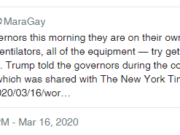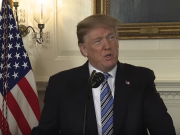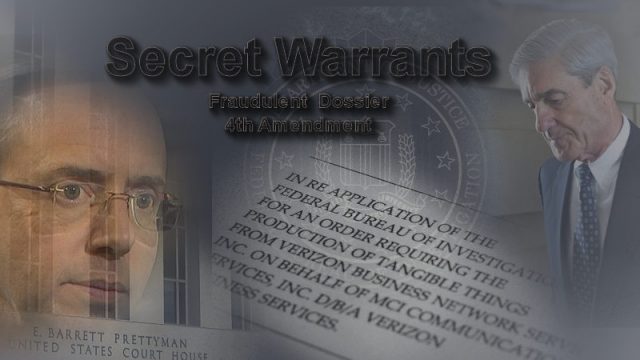Above is a headline Thomas Jefferson never imagined. Just having an one federal police force with over 35,000 employees might have caused the founders of this Republic to spin in their graves. What’s become of our Constitution and its entire purpose? The disgraceful growth of power in the federal government, federal police, and the rise of secret court proceedings and an uncontrollable administrative state are astonishing.
Make no mistake, the Constitution isn’t a living document. It’s dead; and lawyers, liars, and deep state apologists are to blame, as are a Constitutionally ignorant people.
The release of the House Intelligence Committee Memo showing a new and troubling possible abuse of the FISA Court process should have galvanized Americans, be them liberal, conservative, progressive, or libertarian.
A government powerful enough to use its federal police to spy on its political enemies using bogus intel paid for from a foreign agent, misrepresented before a secret court, is the recipe of righteous revolution … not a call for the reincarnation of Tories.
Yes, I know it’s not a “secret court.” It’s just a secret proceeding. Do you feel better?
Twitter is abuzz with various ‘experts’ defending or attacking the House Memo. You can identify most of the anti-liberty partisans when they call the Committee Memo the “Nunes Memo,” suggesting that the majority of the duly elected House Committee, which has Constitutionally mandated House oversight of the FBI, didn’t properly vote to release this startling information.
The left’s narrative is that this is just some rogue Congressman Trumper, and the attempt to frame that narrative is in the not so hidden message of those who call this either the “GOP Memo” or the “Nunes Memo.”
The only transparency left in Washington is the reality that most people are party-first, partisan zealots. Or worse, they are big-government apologists who should know better.
Any American lawyer defending “secret court proceedings,” where political parties buy bogus intel and our federal law enforcement can misrepresent it to a Court in a secret proceeding has not read the Constitution or the Federalist papers.
Why should we be skeptical of these types of proceedings? It is because they slide into the mud on a slippery slope toward federal abuse of police and judicial powers, just as happened here.
On whom is that secret proceeding, warrant-abuse focused? It’s focused on you, me, and Americans who entrust a limited government to secure our freedoms, not curtail them.
Law professors and legal experts are pouring out of the woodwork to explain why the DOJ could present this FBI information as it did to a Court, and that doing so is consistent with prior legal standards for “probable cause” under existing case law.
I really hate lawyers sometimes. Good lawyers can write a rationale for anything, as history shows us. A collection of them once found people of color to be property.
The Constitution was written for every day Americans and meant to be understood by them. It is manipulated, subverted, and in-artfully amended by lawyers and judges. The result is a downward spiral away from its central purpose … Liberty.
The legal standard for obtaining a FISA warrant is quite low, really. Court’s recognize a difference between criminal prosecutions, which invoke a more direct tie to our Fourth Amendment protections, as opposed to an even lower bar the Courts set for surveillance in the interest of the national security. In short, if your government thinks you are working with a foreign power against American interests, it lowers the warrant and surveillance requirements that let your government spy on you.
The result of this lower threshold is that if the government wants to spy on you it is easier to do it by asserting that you are a foreign agent engaging in clandestine intelligence activities.
That’s comforting.
When it comes to spying on me …or you … I prefer we raise the bar and burden on big government.
How hard is it to get one of these Foreign Intelligence Surveillance Act Warrants? Thirty-five thousand have been granted, and 12 have been rejected. Twelve!
When big government wants to spy on you, its law enforcement and legal branches’ burden of making a minimum showing to the government’s judicial branch is quite low. The government is quite literally lined up against you, and those who treat the judiciary like it’s not part of the government, are naive or dishonest.
The House Intelligence Memo seems to show that our federal police and their lawyers have no burden to open their kimonos and expose all the naked truth before a Court. No wonder it is so easy to get a FISA warrant.
That is what the House Intelligence Memo controversy should be about. Should we live in a country where it is so easy to let the federal government spy on Americans and permit it to obtain that permission in secret, based upon false, incomplete, and in this instance, politically paid for and motivated information?
The modern American answer to this question is … it depends on whether the person being spied on is in my party or yours. The Constitutional answer is … hell no! And by Constitution, I mean the actual damn document and not the creeping dilution of it in federal case law.
Why do we let federal law enforcement, using federal lawyers, misrepresent tainted data to a federal court (in a secret proceeding) to sick upon us the state’s police powers in the form of a warrant … or even a formal accusation?
Lawyers and law professors, civil libertarians, and true constitutional conservatives ought to have common cause against these low standards that allow the most powerful federal government on earth track us for any purpose.
Instead, law professors are taking time out from their under-worked schedules in the land of make-believe to “justify” a further lowering of the government’s burden to spy on Americans. In so doing, they use improper parallels, and they seek to normalize and expand the police state to justify political abuses they find in kinship with their own political views.
I follow a great many law professors on twitter and in various publications. These include a number of people I respect as experts, and even people the world treats as such, for not readily apparent reasons. Most law professors from good schools are smart minds, and even when wrong, they are a useful follow to understand their thinking, agenda, and the direction they are taking the next group of lawyers.
Sadly, many law professors are not taking our next group of law students toward liberty, privacy, and freedom from government intrusion. They are teaching them how such government activities, antithetical to our founding and Constitution, can be justified.
In a bizarre world, the radical, cop-hating, law enforcement-distrusting, stick-it-to-the-man left is out there battling to defend federal police powers, secret court proceedings, and politically motivated, government-endorsed, spying.
For the same reason I have vigorously opposed using indictments as one-sided, state-sanctioned efforts to charge Americans by holding back key facts from grand juries, I likewise find these troubling FISA warrant developments wholly inappropriate. And, to be clear, this case has no known, legal parallels.
Professor Orin Kerr is a recognized expert in criminal law, and he teaches the subject matter to prospective young lawyers. He’s an accomplished scholar, which in that field means he has published work in law review journals. I rather like him, and following his analysis is a useful endeavor for people interested in legal analysis.
On this issue, the professor is dead wrong on the central focus of his agenda driven analysis.
He had a guest piece recently in the New York Times that is making the rounds across social media among the class of individuals who do serious reading and thinking.
Kerr, who does not like Trump … and falls more in the Trumper hater category than a Trump critic category, rolled out what would appear to be a lucid critique of those who think the House Memo shows some new, outrageous behavior. In short, the professor assures us that just like a regular criminal case, where a not so perfect criminal informant with a shady past is used by law enforcement to get a warrant, this too is pretty much the same thing.
It is not.
That conclusion is weak, profoundly incorrect, and indeed, misleading. Professor Kerr is correct about the Memo in some respects, including the reality that without seeing more of the source data, and knowing all the information on which the Court relied, the Memo itself doesn’t let an objective reader conclude that the Judge erred in issuing the warrant, or even that the DOJ failed to give the Judge sufficient legitimate information to do so.
The Memo isn’t a smoking gun, but it is a clear and stark warning that liberty is on the run.
We don’t really know from the Memo what was the totality of the information presented to the Judge. I agree we need to know that.
We do know this, however, Kerr’s likening of a criminal fact witnesses in a meth-making case turning state’s evidence for promised leniency and using that criminal’s biased representations as the basis for a warrant, bear no resemblance to the case at hand. None.
In Kerr’s op-ed, he asks plainly, “who is more likely to lie, criminals seeking leniency, or a former British intelligence agent hired for his expertise?”
Well, the fair answer to that loaded rhetorical question would come from finding out who was the “intelligence agent” hired by and how much was he paid? Moreover, Kerr conveniently fails to note that in the case he cites, the criminal informant is, indeed, a fact witness connected to the crime, with obvious first-hand knowledge as a participant.
The British agent is nothing more than an over-priced private dick, hired through a money laundering scheme to dig up information to which he is transparently not a fact witness. That alone is a huge difference in these cases.
Oh, did I mention that the money laundering scheme involved him being hired and paid through a mega law firm? Did I mention the laundered money was sent through the firm as expert witness payments on behalf of a major political party for the purpose of destroying a Presidential opponent during a Presidential election? Did I mention the party that controlled the federal police and lawyers were the same as the party that paid for the dirt?
Anyone see this as a parallel to a meth cooking case? Likewise, this is not just some run-of-the-mill political skullduggery.
Ironically, Professor Kerr identifies a foreign intelligence agent interfering with a US election, while being paid laundered money by a US political party to do the hatchet work for a candidate who is the endorsed pick of the man who appointed the DOJ head and who runs the FBI.
Professor Kerr glazes over foreign intrusion and collusion in the US election to equate this “expert” intelligence bloke, a foreign national, to an American CI and fact witness in an everyday criminal case. All of this is done to justify a warrant issued under very troubling circumstances.
Professor Kerr wind-sprints past the critical issue … which is the ease with which our government can spy on its citizens and the new reality that the political party in control can use federal law enforcement, federal lawyers, and unverified and or false political dirt bought from foreign intelligence sources by a political party to do so.
How is that NO PART of the substantial analysis even if he reached the same conclusion? In his own law class, missing the key issue and failing to analyze it would merit a C or less.
Instead, the Professor initiates the reader with the same clinical analysis of the law bar to get a warrant. Then he proceeds to this inane comparison. In truth, America has never had a case like this.
Never has a major political party paid a foreign national to dig up dirt, falsify a report, hand over sources, and then use that information through the President’s controlled DOJ and FBI, to go to a secret proceeding, and obtain a warrant to spy on a Presidential opponent of another party.
There are no parallels, and Professors, of any esteem who draw them, are coloring outside the lines of the Constitution, hoping to find justification for government action, rather than trying to hold the government to account for its actions.
America is better, and freer, when our legal academics question government power that limits American liberty.
Kerr’s entire analysis proceeds from the viewpoint that the Memo is no big deal. It shows no real proof of wrongdoing, and it is alarmist because we don’t know how much of the dossier was relied upon to obtain the warrant, nor do we know how much had been debunked at the time the warrant was sought.
The correct parts of his critique would be more compelling if he didn’t cavalierly dismiss any concerns about the low bar to spy and the introduction of political skullduggery into the process. His analysis is both a misdirection and a justification for more government power and control over our lives, rather than any honest legal concern for our liberty.
We know that the government’s ability to spy on you and me is too easy, the bar is too low, and the government intrusion is too big. Mr. Kerr’s analysis never considers if any of those questions are true, which is odd ground for a criminal law professor cede.
Even days later, Professor Kerr joins a cacophony of apologists who now say that the affidavit for the FISA warrant had a footnote saying it could be politically motivated. Great, did it mention who paid who through what money laundering scheme?
Americans now must wonder, based on this House Intelligence Committee Memo if paid political hackery can be used, in part, in a secret court proceeding, by a federal lawyer, before a federal court, and on behalf of federal law enforcement, at the behest of a political party, to obtain a warrant to spy on political opponents.
Because these FISA proceedings are secret, and our government won’t release the source information upon which such warrants are based, we don’t know how much of this politically manufactured dirt is used to unleash the power of police surveillance. We don’t know how often this happens either!
I think that’s bad … and I have no idea why current Americans can’t unify behind that obvious flaw.
I do know this, your founding fathers never intended to create this intrusive, police state, federal leviathan, nor did they intend for such a government or this type of conduct to evolve from our founding. Frankly, everything the founders ever did was designed to make sure that the central power of government could never be used against us this way.
We have failed them.
Author: Richard Kelsey
Richard Kelsey is the Editor-in-Chief of Committed Conservative.
He is a trial Attorney and author of a #11 best-selling book on Amazon written on higher education, “Of Serfs and Lords: Why College Tuition is Creating a Debtor Class”
Rich is also the author of the new Murder-Mystery series, “The ABC’s of Murder,” book one is titled, “Adultery.”
Rich is a former Assistant Law School Dean and Law Professor. At Mason Law Kelsey conceived of, planned, and brought to fruition Mason’s Center for the Protection of Intellectual Property, known as CPIP, drawing on his expertise as a former CEO of a technology company specializing in combating cyber-fraud.
In 2014 he was elected by the graduating class as the faculty speaker at their graduation.
He is a regular commentator on legal and political issues in print, radio and on TV. Rich has appeared on hundreds of stations as a legal expert or political commentator. He provided the legal analysis for all stages of the Bob McDonnell trial and appeal for numerous outlets including NPR and WMAL.
Rich also writes on occasion for the American Spectator and CNSNews.com.
In his free time, Rich is part of the baseball mafia of Northern Virginia, serving on numerous boards and as a little league and travel baseball coach.
His Twitter handle is @richkelsey.
































